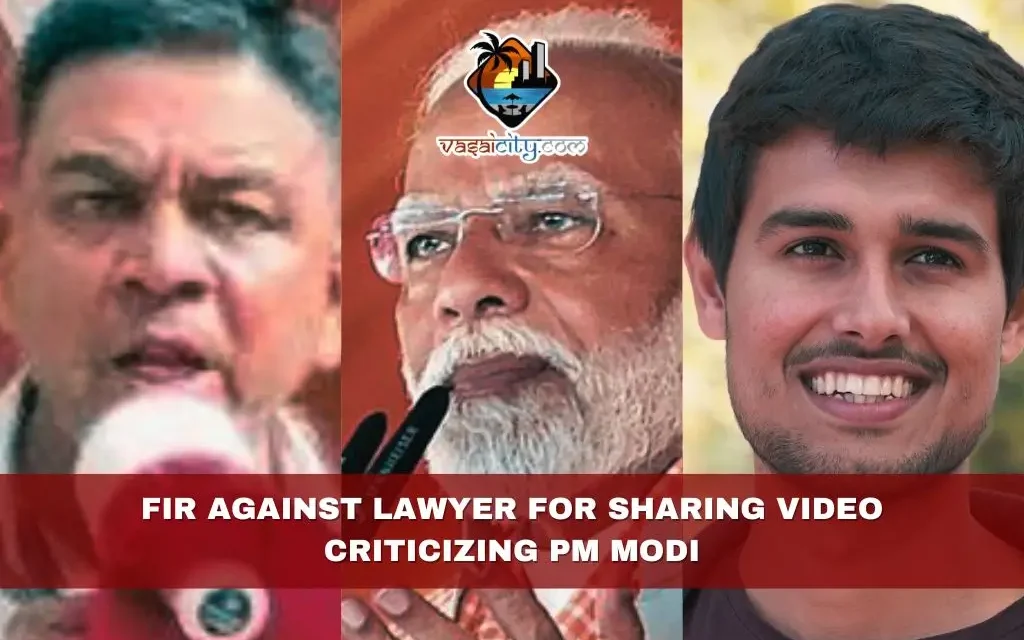In Maharashtra, the Mira Bhayandar Vasai Virar (MBVV) police registered a First Information Report (FIR) against a lawyer for sharing a video by YouTuber Dhruv Rathee that criticizes Prime Minister Narendra Modi. This incident took place during the Lok Sabha elections in the state.
Incident Overview
On May 20, advocate Adesh Bansode, who also holds the position of Maharashtra secretary for the Communist Party of India (Marxist-Leninist) Liberation, shared a link to a video titled “Mind of a Dictator” by Dhruv Rathee. He posted this link in the Bar Association of Vasai’s WhatsApp group, along with a message urging members to watch the video before casting their votes. The fifth phase of the Lok Sabha elections occurred on that same day.
The situation escalated when another lawyer, who found the video objectionable, lodged a complaint with the police. As a result, the police took it upon themselves to file a suo motu complaint and registered an FIR against Bansode on May 21.
Details of the FIR
The FIR was registered based on a complaint from a head constable in the MBVV Police’s secret branch. According to the complaint, the video and its accompanying message allegedly made false statements about Lok Sabha election candidates and attempted to influence voters. This, the police stated, was a violation of the prohibitory orders issued by the Commissioner of Police.
MBVV Police Commissioner Madhukar Pandey had issued a prohibitory order for the period between May 18 and May 20 to ensure the smooth conduct of the general elections. Sharing such material during this time was deemed to be in violation of these orders.
Legal Arguments
Adesh Bansode has strongly opposed the FIR, calling it illegal and an attempt by the state to suppress free speech. He argued that the police did not follow due legal procedures before filing the FIR under Section 188 of the Indian Penal Code (IPC), which pertains to disobedience to an order duly promulgated by a public servant.
Bansode pointed out that under Section 195 of the Criminal Procedure Code (CrPC), the police are required to obtain prior permission from the concerned court before registering an FIR under Section 188 of the IPC. This procedural step, he claimed, was not followed in his case.
“The video shared by me has been viewed, liked, and shared by millions of internet users. Are the police planning to file cases against all of them?” Bansode questioned. He expressed his intent to protest against what he called an “illegal FIR.”
Public Reaction and Implications
The incident has sparked a debate on the balance between free speech and adherence to legal restrictions during sensitive periods like elections. Supporters of Bansode argue that sharing a video, especially one that is already widely available on the internet, should not be grounds for legal action, particularly when it pertains to political opinion.
Critics, however, maintain that such actions could disrupt the electoral process and potentially influence voter behavior, which is why the prohibitory orders exist in the first place. The police’s stance is that maintaining a fair and unbiased electoral environment is paramount, and any attempts to sway voters through potentially misleading information must be curbed.
Broader Context
This case is not isolated but rather part of a broader trend where individuals, including activists and members of political parties, face legal action for their online activities. The use of social media and digital platforms to share political content has become a double-edged sword. While it democratizes information and provides a platform for diverse voices, it also raises concerns about the spread of misinformation and the impact on democratic processes.
Conclusion
The FIR against Adesh Bansode for sharing Dhruv Rathee’s video has highlighted the ongoing tension between free expression and regulatory oversight during elections. As the legal proceedings unfold, it remains to be seen how the judiciary will address these complex issues. For now, the incident serves as a reminder of the delicate balance required to uphold democratic principles in the digital age.














